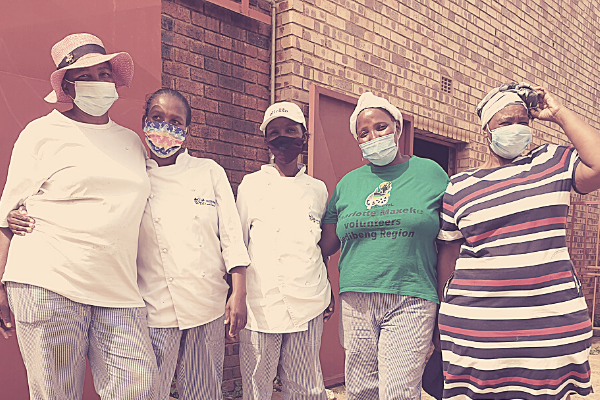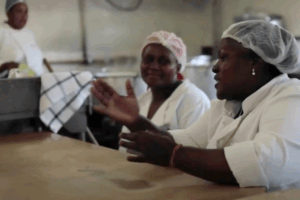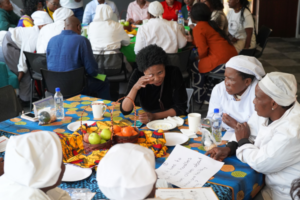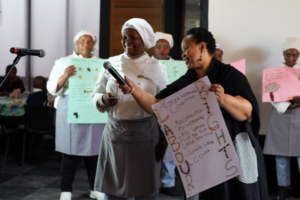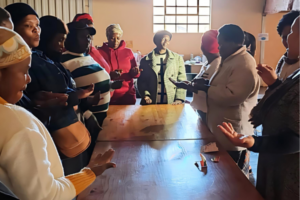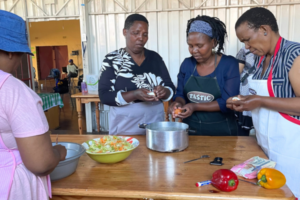To understand how the community perceives volunteer food handlers, we must first consider their dual roles. Volunteer food handlers are employees of the school and members of the broader community.
Through engaging with various groups in Gauteng Province, we have some clarity about the role of volunteer food handlers in the National School Nutrition Program (NSNP). We also know more about how the different communities view these workers.
In the school community, volunteer food handlers experience undervaluing and insecurity. At the community level, people view food handlers with distrust and negativity. The community members evaluate the role of the volunteer food handler through a biased lens and the poverty, unemployment and job insecurity perpetuate it.
Responsibilities, hiring and evaluation process
Volunteer food handlers are hired through the National School Nutrition Programme to prepare and serve nutritious meals and ensure the cleanliness and sterility of cooking areas. The position is competitive. Many unemployed parents apply and get on a waiting list.
Volunteer food handlers are all unemployed parents and community members who face hardship in the context of high inequality and unemployment rate. The majority of the workers are women and often mothers of learners in the school. For a monthly stipend of R1 600, the volunteer food handlers operate school kitchens five to six days a week. Everyone agrees the pay is paltry. Still, the job postings attract many candidates who seek to earn an income.
The volunteer food handler sees value in the role of cooking for school children. Yet the members of the communities in which they operate don’t share the same sentiment. Even the evaluating process of the school nutrition programme seems to view these workers separately. While the program is seen as necessary and lauded for its successes, lacklustre performance is likely to be attributed to volunteer food handlers. Take the meeting participants in the Vaal comprising previous food handlers, parents, community workers and current and previous beneficiaries of the school nutrition programme. They overwhelmingly expressed dissatisfaction with volunteer food handlers and their role in the NSNP.
How does the community view the volunteer food handler role?
The sentiments of the community members offer some insight.
On the one hand, they see the NSNP as a needed intervention for mitigating poverty, food insecurity and low performance of learners. But they also see the programme failing at the hands of volunteer food handlers who they view as dishonest, self-serving, and unskilled. For example, when asked if the NSNP is important, a community member said:
"Yes, the government provides food for disadvantaged children; however, the problem is that the cooks misbehave."
Community member
Volunteer food handlers are also community members who live amongst and interact with the community throughout their employment in the NSNP and some community members can be subjective and present their personal views and misconceptions about them as facts.
For example, some former food handlers expressed unhappiness with how current volunteer food handlers connect with school children. Displeased with the short-term nature of the food handler job, they said:
"When we were volunteer food handlers, we cooked out of the compassion we had for the children. Lately, the cooks don't care but do it because they are desperate for employment."
Former Volunteer Food Handler
Other community members said volunteer food handlers are under-skilled and can’t deliver palatable and nutritious food to children:
“The cooks don’t eat the food they cook”.
Community members
Also, they took issue with the perceived bad attitudes and self-serving habits of volunteer food handlers:
"…Remuneration for the cooks is not enough, which encourages them to steal supplies to supplement their incomes."
Community members
One community member felt the NSNP appeared perfect on paper but is different in reality.
"... As community workers, we are unhappy because the cooks make snide remarks towards kids such as, 'you're taking food because you are poor' or 'you don't want food because you think you're better."
Community member
The school as the workplace
The views of the community members about certain food handlers extend to the school community. It’s common for school children to behave in a certain way towards some food handlers after hearing talk in the community. “…Rumours of witchcraft cause children to refrain from eating when certain cooks are on shift.”
The volunteer food handlers said some schoolchildren are disrespectful and make the job hard when they scatter food and dishes in the school compound. Meanwhile, school children (who are the direct beneficiaries of the program) complained about the food given to them, saying:
"The food (they give us) has no salt or spice. It's dry and not tasty. They give us tinned fish cooked in boiled water".
Learner
Volunteer food handlers get blamed when schoolchildren fall sick, even without adequate investigation. However, this view lacks consideration of the fact that food handlers prepare meals according to set methods, recipes and ingredients provided to them through the nutrition programme. A male community worker at the Vaal community meeting explained that many complaints emerged from the community about the lack of cleanliness in school kitchens, which he attributed to the laxity of food handlers.
Volunteer food handlers felt overlooked in the school community during the Covid-19 pandemic. Despite being essential workers, they were overlooked for priority vaccination. Members of the school community are known to carry out unfair practices toward volunteer food handlers based on negative stigmas. For example, some food handlers said that schoolteachers who supervise them often accuse them of theft and banned handbags at the workplace.
"We are not allowed to carry our bags which segregates us from the rest of the people".
Volunteer Food Handler
Also, they are denied access to food storage facilities, which affects their work.
Furthermore, volunteer food handlers are not protected by School Governing Bodies (SGBs) who they say threaten their job security when they raise concerns regarding their working conditions. Because volunteer food handlers are usually parents of children in the schools where they work, they are often perceived as poor and unimportant as everybody knows how much they earn. As a result, they are further demeaned and devalued in the school community. However, they are aware that the learners adopt the devaluing behaviour from other school staff like teachers and principals.
Volunteer food handlers feel that they play a significant role in the lives of school children and the community in general and often go beyond their call of duty to intervene and lend a helping hand wherever needed. Yet, they are still largely undervalued by family and school communities. Volunteer food handlers yearn to be recognised and valued as workers, and they recognise it will take much work to achieve.
Power Up! advocacy tools
A day in the life of Volunteer Food Handler
Experience a day in the life of Khuli Gumede, a Volunteer Food Handler with the National School Nutrition Programme, as she goes about her daily routine. As we delve into Khuli’s journey, we uncover the realities faced by Volunteer Food Handlers. These remarkable individuals, predominantly women and mothers of the children in the schools they serve, have multifaceted lives beyond their role.
Jabula song
Developed with a core group of Volunteer Food Handlers, ‘Jabula’ is an advocacy tool in our campaign to recognise and value the work of Volunteer Food Handlers. The word Jabula means to rejoice, to be happy. The song expresses the commitment and passion of Volunteer Food Handlers in the National School Nutrition Programme to ensure that all learners have access to the nutrition they need to thrive in school.

